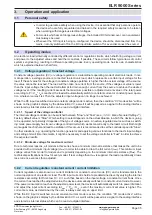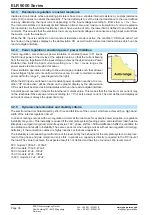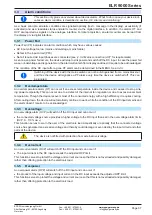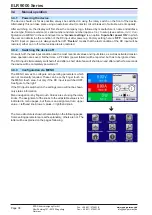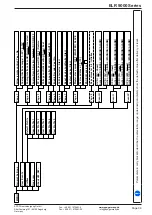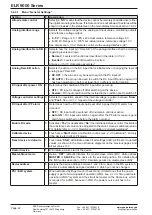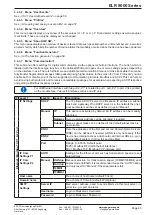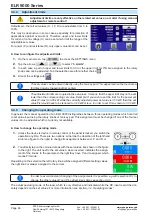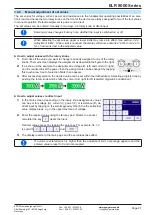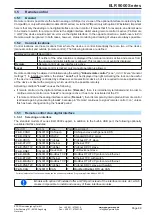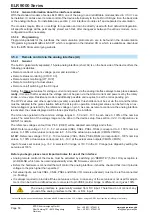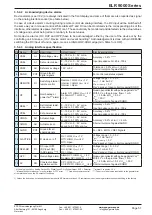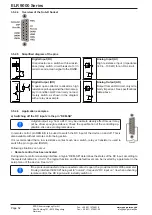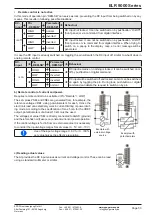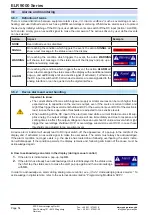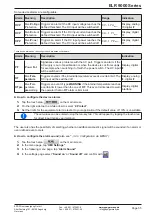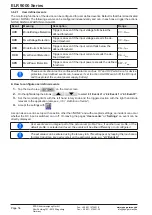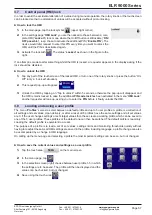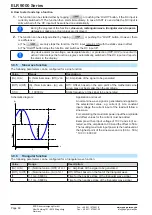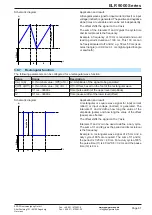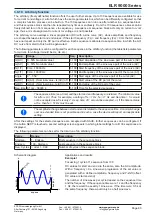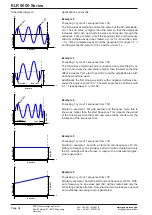
Page 49
EPS Stromversorgung GmbH
Alter Postweg 101 • 86159 Augsburg
Germany
Fon: +49 821 / 570451-0
Fax: +49 821 / 570451-25
ELR 9000 Series
3.5
Remote control
3.5.1 General
Remote control is possible via the built-in analog or USB port or via one of the optional interface modules (AnyBus
CompactCom, only with standard models of ELR series) or via the GPIB port (only with option 3W installed). Important
here is that only the analog or one digital interface can be in control. It means that if, for example, an attempt were
to be made to switch to remote control via the digital interface whilst analog remote control is active (Pin Remote
= LOW) the device would report an error via the digital interface. In the opposite direction a switch-over via Pin
Remote would be ignored. In both cases, however, status monitoring and reading of values are always possible.
3.5.2 Controls locations
Control locations are those locations from where the device is control. Essentially there are two: at the device
(manual control) and outside (remote control). The following locations are defined:
Displayed location Description
-
If neither of the other locations is displayed then manual control is active and access from
the analog and digital interfaces is allowed. This location is not explicitly displayed
Remote
Remote control via any interface is active
Local
Remote control is locked, only manual operation is allowed.
Remote control may be allowed or inhibited using the setting
“Allow remote control”
(see
). In inhibited condition, the status
“Local”
will be displayed top right. Activating the lock can be useful
if the device is remotely controlled by software or some electronic device, but it is required to make adjustments
at the device or deal with emergency, which would not be possible remotely.
Activating condition
“Local”
causes the following:
•
If remote control via the digital interface is active (“
Remote
”), then it is immediately terminated and in order to
continue remote control once “
Local
” is no longer active, it has to be reactivated at the PC
•
If remote control via the analog interface is active (“
Remote
”), then it is temporarily interrupted until remote control
is allowed again by deactivating “
Local
”, because pin “Remote” continues to signal “remote control = on”, unless
this has been changed during the “
Local
” period
3.5.3 Remote control via a digital interface
3.5.3.1 Selecting an interface
The standard models of series ELR 9000 support, in addition to the built-in USB port, the following optionally
available interface modules:
Short ID
Art. nr.
Type
Ports Description*
IF-AB-CANO
35400100 CANopen
1
CANopen slave with generic EDS
IF-AB-RS232
35400101 RS232
1
Standard RS232, serial
IF-AB-PBUS
35400103
Profibus
1
Profibus DP-V1 slave
IF-AB-ETH1P
35400104 Ethernet
1
Ethernet TCP
IF-AB-PNET1P
35400105
ProfiNet
1
Profinet DP-V1 slave
IF-AB-DNET
35400106 Devicenet
1
Full Devicenet slave
IF-AB-MBUS
35400107 ModBus TCP 1
ModBus RTU/TCP protocol via Ethernet
IF-AB-ETH2P
35400108 Ethernet
2
Ethernet TCP, with switch
IF-AB-MBUS2P
35400109 ModBus TCP 2
ModBus RTU/TCP protocol via Ethernet
IF-AB-PNET2P
35400110
ProfiNet
2
Profinet DP-V1 slave, with switch
IF-AN-CAN
35400111 CAN
1
Modified ModBus RTU via CAN
* For technical details of the various modules see the extra documentation “Programming Guide Modbus & SCPI”
Models with option 3W installed offer a GPIB port instead of the interface module slot, which
makes it impossible to install and use any of these interface modules.

